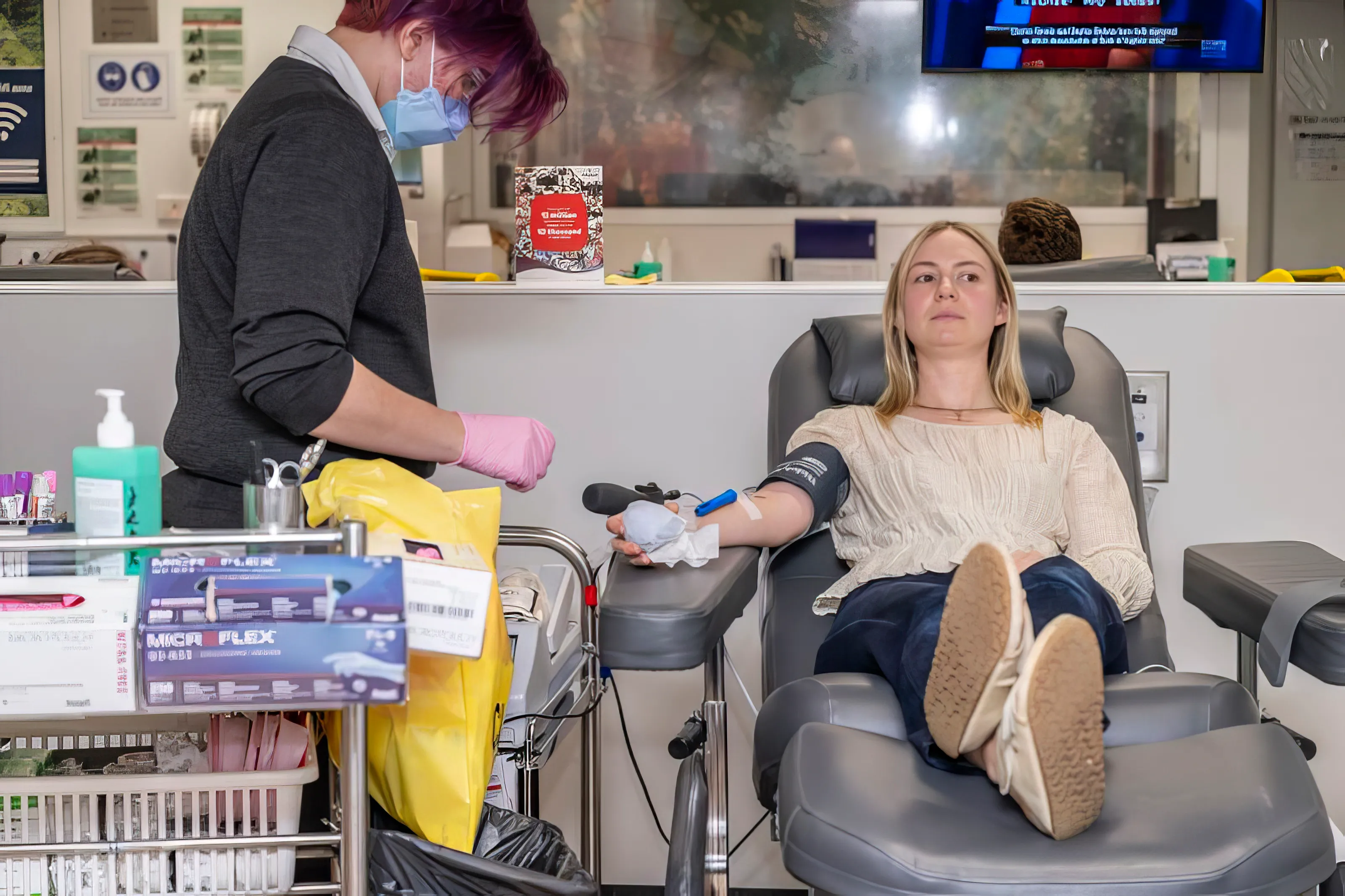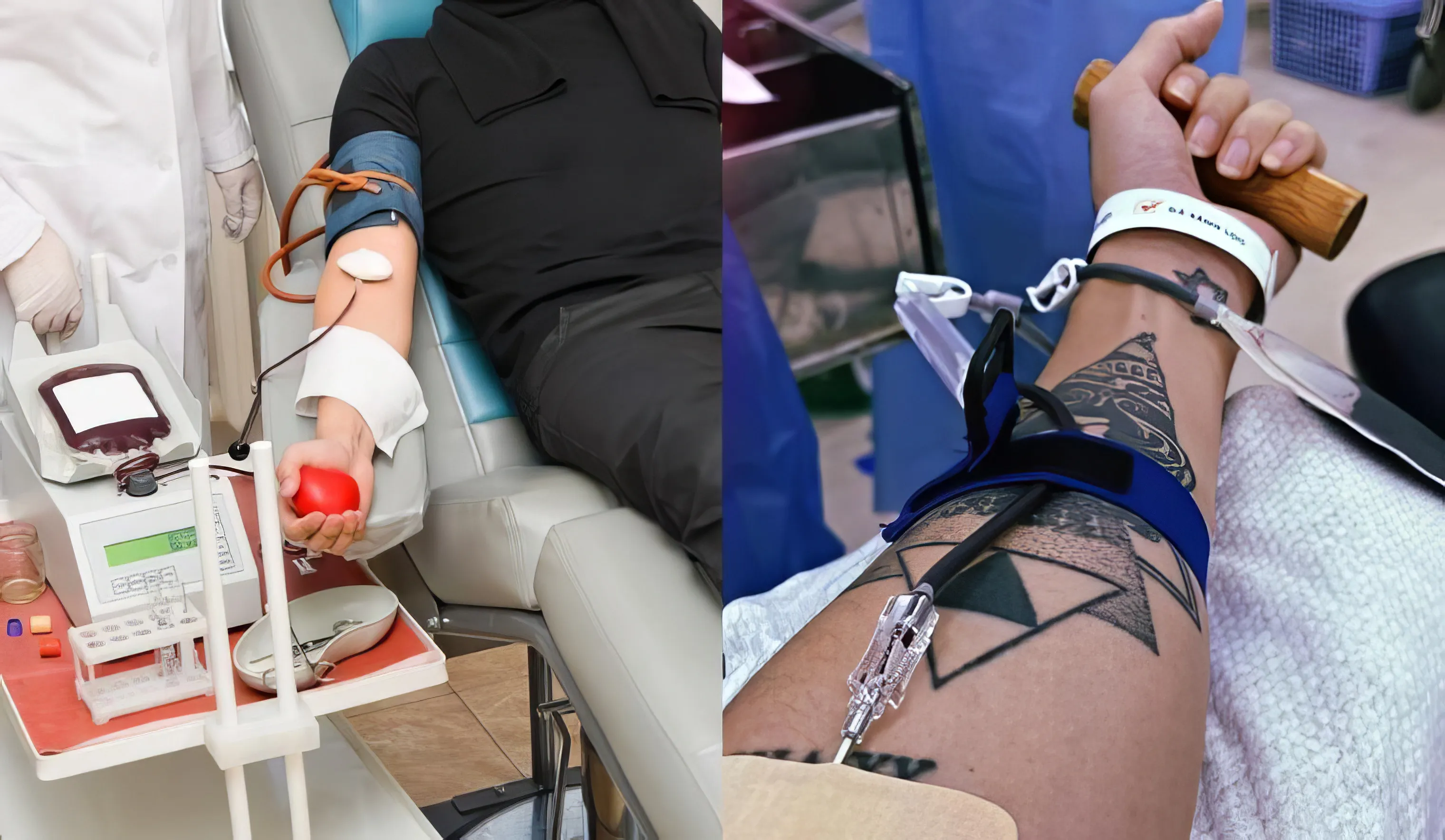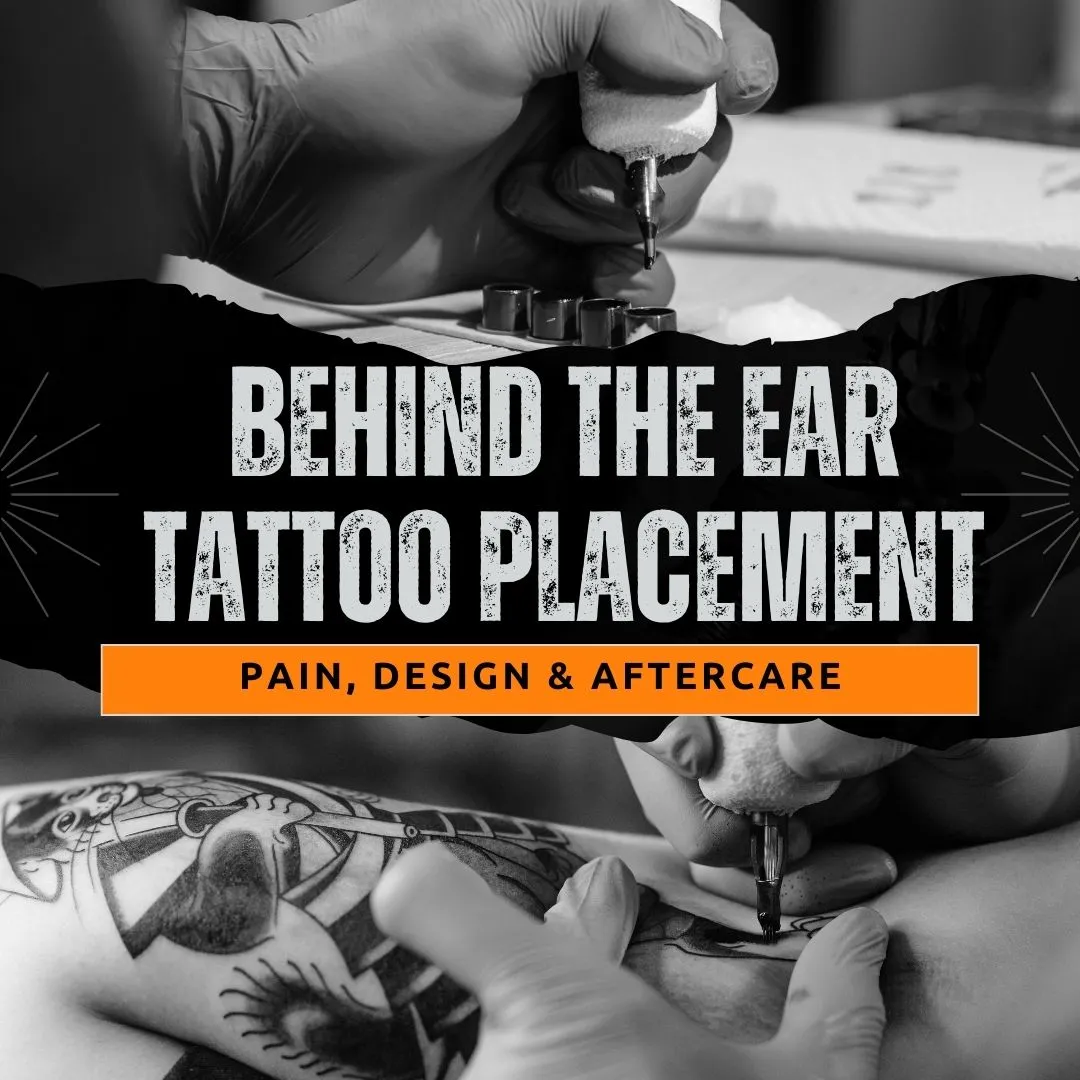Can You Donate Blood After a Tattoo? Many people with tattoos mistakenly believe they’re permanently ineligible to donate blood — but the truth is far more nuanced. Factors like timing, hygiene practices, and local regulations all play a role. At H2M Tattoo Studio, we break down the facts, clear up common myths, and provide essential guidance to help tattooed individuals give blood safely and confidently.
Understanding Blood Donation After Tattooing
The intersection of tattooing and blood donation represents a careful balance between personal freedom and public health safety. This topic generates frequent questions because both tattooing and blood donation have become increasingly common, with nearly a third of Americans having at least one tattoo.
The relationship between these two activities centers on the potential for bloodborne pathogen transmission during the tattooing process. When tattoo needles penetrate the skin and deposit ink, they create a pathway for infections to enter the bloodstream. While professional tattooing practices have evolved significantly to minimize these risks, medical authorities maintain precautionary measures to protect blood recipients from potential contamination.

Blood donation organizations approach tattoo-related eligibility from a public health perspective, recognizing that donated blood will be transfused into patients who may be immunocompromised, undergoing surgery, or managing serious medical conditions. These vulnerable populations require the highest possible safety standards for blood products, which necessitates careful screening of all donors, including those with recent tattoos.
The modern approach to tattoo-related blood donation guidelines reflects evidence-based medicine and risk assessment. Rather than implementing blanket bans, medical authorities have developed nuanced policies that consider factors such as tattoo studio licensing, sterilization practices, and infection detection windows. This approach allows for responsible blood donation while maintaining safety standards.
Understanding this framework helps tattooed individuals appreciate that temporary deferrals serve a legitimate medical purpose rather than representing discrimination against body art. The goal is creating a blood supply system that maximizes both donor participation and recipient safety.
>>>> READ MORE: Can you shower after a new tattoo? 10 Essential Guidelines for Proper Care
Why Is There a Waiting Period After Getting a Tattoo?
The mandatory waiting period following tattooing serves critical medical and public health functions, primarily centered around infection prevention and detection. This deferral period isn't arbitrary but reflects scientific understanding of how bloodborne infections develop and become detectable through laboratory testing.
Key Infection Risks Associated with Tattooing
The primary concerns that drive waiting period requirements include:
- Hepatitis B: A serious liver infection that can become chronic and lead to liver damage or liver cancer
- Hepatitis C: Another liver infection that often becomes chronic and may not show symptoms for years
- HIV (Human Immunodeficiency Virus): A virus that attacks the immune system and can lead to AIDS if untreated
- Bacterial infections: Various bacterial pathogens that can cause sepsis or other serious complications
- Other bloodborne pathogens: Less common but potentially serious infections transmitted through contaminated blood

The purpose of this regulation is to protect patients receiving donated blood because the introduction of a foreign item, such as ink through needles, into your body involves a danger of blood-borne infection. The risk level varies significantly depending on the tattooing environment and practices employed.
The Medical Window Period
The human immune system requires time to produce detectable antibodies after exposure to infections. This "window period" varies by pathogen but typically ranges from several weeks to three months. During this time, standard blood screening tests may not detect infections even if they are present, making it unsafe to use blood from recently exposed individuals.
Licensed vs Unregulated Facilities
The infection risk associated with tattooing varies dramatically based on the facility's safety standards. Licensed tattoo studios must follow strict health department regulations including:
- Use of single-use, sterile needles and equipment
- Proper sterilization of reusable instruments
- Safe disposal of contaminated materials
- Maintenance of clean work environments
- Staff training in infection prevention
Unregulated or unlicensed facilities may not adhere to these safety standards, significantly increasing infection risks. This distinction explains why some blood donation organizations have different deferral periods for tattoos from licensed versus unlicensed establishments.

>>>> SEE MORE: what to do after getting a tattoo for Perfect Healing
Blood Donation Guidelines Around the World
International blood donation organizations have developed varying approaches to tattoo-related deferrals, reflecting different healthcare systems, infection rates, and regulatory environments. Understanding these differences helps clarify why policies vary and which guidelines apply to your situation.
World Health Organization (WHO) Perspective
While the WHO doesn't mandate specific deferral periods for tattoos, it provides framework guidance emphasizing risk-based assessment approaches. If you have recently had a tattoo or body piercing you cannot donate for 6 months according to general WHO guidance, though individual countries may implement different standards based on local conditions and risk assessments.
The WHO emphasizes the importance of evidence-based policies that balance blood safety with donor availability, encouraging national blood services to regularly review and update their criteria based on emerging research and local epidemiological data.
United States - FDA and American Red Cross
The U.S. approach has evolved significantly in recent years, moving toward more nuanced, risk-based policies:
A tattoo is acceptable if the tattoo was applied by a state-regulated entity using sterile needles and single-use ink. Cosmetic tattoos (including microblading of eyebrows only) applied in a licensed establishment in a regulated state using sterile needles and single-use ink is acceptable.
For unregulated facilities, donors must wait 12 months before donation. This dual approach recognizes that regulated tattoo establishments pose minimal risk while maintaining caution regarding unregulated facilities.
United Kingdom - NHS Blood Donation Services
The UK maintains a uniform approach across its blood donation services: You have to wait for four months after having a tattoo before you can give blood. This includes semi-permanent make-up and microblading and the wait is the same for body piercings and acupuncture.
If you've had a tattoo or piercing, you'll have to wait for four months before giving blood. This is because some blood-borne viruses, such as Hepatitis B, can be spread by unsterile needles. The NHS approach applies regardless of the facility's licensing status, representing a more conservative stance than some other countries.
Australia - Lifeblood Services
Australia has implemented one of the most progressive policies globally, recently reducing deferral periods for tattoos performed in licensed Australian establishments to just seven days. This change reflects confidence in the country's tattoo regulation standards and advances in infection screening technology.
For tattoos performed overseas or in unlicensed facilities, longer deferral periods apply, demonstrating a risk-stratified approach that considers both facility standards and geographic factors.
Singapore - Health Sciences Authority
Singapore maintains moderate deferral periods while emphasizing the importance of facility licensing and safety standards. The city-state's compact geography and strong regulatory framework allow for relatively standardized policies across all tattoo establishments.

>>>> READ MORE: what to moisturize tattoo with To Recover Quickly And Keep The Color Lasting And Beautiful
Can and Should You Donate Blood Immediately After Getting a Tattoo?
The answer to whether you can donate blood immediately after getting a tattoo is unequivocally no, regardless of where you received your tattoo or how reputable the establishment may be. This restriction exists for compelling medical and safety reasons that protect both blood recipients and the integrity of the blood supply system.
Why Immediate Donation Is Unsafe and Prohibited
Even when tattoos are performed in the most sterile, professional environments using the highest safety standards, the tattooing process inherently creates conditions that make immediate blood donation inappropriate. The skin barrier has been compromised, foreign substances (tattoo ink) have been introduced into the body, and the immune system is responding to this controlled trauma.
During the tattooing process, needles puncture the skin thousands of times to deposit ink in the dermal layer. Despite sterile conditions, this process creates microscopic pathways for potential pathogens to enter the bloodstream. While modern tattoo establishments follow strict safety protocols, the theoretical risk of infection transmission cannot be completely eliminated during the immediate post-tattoo period.
The Healing and Detection Timeline
Fresh tattoos require significant healing time, typically spanning several weeks for the visible healing process and up to several months for complete internal healing. During this period, the body's immune system is actively responding to the tattoo, potentially affecting blood chemistry and making infection detection more challenging.
The critical factor is the infection detection window period. Even if an infection occurs during tattooing, standard blood screening tests may not detect it immediately. Antibodies for hepatitis B, hepatitis C, and HIV take time to develop to detectable levels, creating a window during which infected blood could pass screening tests while still being dangerous to recipients.
Protecting Public and Donor Health
The deferral period serves dual protective functions. For blood recipients, it ensures that any potential infections have sufficient time to become detectable through routine screening procedures. For donors, it allows time for any tattoo-related complications to manifest and be addressed before donation, protecting donor health during the blood collection process.
A good rule of thumb is that you may not be able to give blood if your tattoo is less than 3 months old. This goes for piercings and all other nonmedical injections on your body, too. This conservative approach reflects the medical community's commitment to maintaining the highest possible safety standards for blood transfusion recipients.

>>>> SEE MORE: can you put sunscreen on a healing tattoo ? Common Mistakes To Avoid
Risks of Donating Blood Too Soon After a Tattoo
Attempting to donate blood too soon after receiving a tattoo poses significant risks to blood recipients and can compromise the safety of the entire blood supply system. Understanding these risks helps explain why deferral periods exist and why honest disclosure during screening is essential.
Risks to Blood Recipients
The primary concern with early post-tattoo blood donation is the potential transmission of bloodborne infections to vulnerable patients. Blood recipients often include:
- Surgical patients who may have compromised immune systems during recovery
- Cancer patients undergoing chemotherapy with weakened immune systems
- Trauma victims who need immediate transfusions and cannot wait for extensive testing
- Chronic disease patients who require regular transfusions and have ongoing health challenges
- Newborns and children whose immune systems may not handle infections as effectively as healthy adults
For these vulnerable populations, receiving infected blood can be life-threatening, turning a life-saving treatment into a serious health hazard.
Impact on Blood Supply Safety
When contaminated blood enters the supply system, it can trigger extensive recalls and testing procedures that affect hundreds of other donations. A single infected unit can:
- Contaminate blood processing equipment if not properly sterilized
- Require recall and retesting of blood products processed in the same batch
- Necessitate contact tracing and testing of previous recipients
- Damage public confidence in blood donation safety
- Create shortages during critical periods when blood is most needed
Enhanced Risks from Unsterile Practices
The risks multiply significantly when tattoos are performed in unregulated or improperly managed facilities. Unsterile tattooing equipment can harbor multiple pathogens simultaneously, potentially exposing donors to several infections concurrently. These facilities may reuse needles, fail to properly sterilize equipment, or maintain unsanitary work environments that increase contamination risks.
Even well-intentioned tattoo artists working in substandard conditions may unknowingly expose clients to serious health risks. The combination of inadequate sterilization procedures and the immediate post-tattoo vulnerability period creates conditions where infection transmission becomes more likely and more difficult to detect through standard screening procedures.
Ensuring Eligibility to Donate After a Tattoo
Successfully donating blood after receiving a tattoo requires careful preparation, honest communication, and adherence to established guidelines. Following these steps helps ensure your donation experience is safe, efficient, and contributes positively to the blood supply.
Confirming Your Tattoo Was Done Safely
Before considering blood donation, verify that your tattoo was performed in a licensed, regulated facility that follows proper safety protocols. Key indicators of a safe tattoo experience include:
Licensed Studio Verification:
- Check that the facility holds current state and local licenses
- Verify health department inspections and compliance records
- Confirm the tattoo artist's individual licensing and certification
- Research the studio's reputation and safety record online
Safety Protocol Confirmation:
- Single-use needles that were opened in your presence
- Sterile, individually packaged ink portions that weren't shared between clients
- Proper disposal of contaminated materials in biohazard containers
- Clean, sanitized work surfaces and equipment
- Use of gloves changed between clients and procedures
Preparing for Donation Post-Tattoo
Once the appropriate waiting period has passed, prepare for your donation appointment by:
Health Status Assessment:
- Ensure your tattoo has healed completely without complications
- Verify you feel healthy and haven't experienced any unusual symptoms
- Check that you meet all other donation eligibility criteria (age, weight, general health)
- Review any medications you're taking for potential conflicts
Documentation Gathering:
- Note the exact date of your tattoo for accurate reporting
- Gather information about the tattoo studio's licensing status
- Prepare to discuss the tattoo location and any healing complications
- Bring identification and any previous donation records

Importance of Honest Disclosure During Screening
Truthful communication during the pre-donation screening process is essential for maintaining blood safety and protecting your own health:
Complete Disclosure Checklist:
- Provide accurate tattoo date and location information
- Describe the facility where you received your tattoo
- Report any complications or unusual healing experiences
- Disclose any recent travel or other potential risk factors
- Answer all health screening questions honestly and completely
- Ask questions if you're uncertain about any eligibility criteria
- Report any changes in your health since your last donation
What Donation Centers Evaluate
Blood donation centers assess multiple factors when screening tattooed donors:
- Timing compliance: Verification that sufficient time has passed since tattooing
- Facility safety: Assessment of where the tattoo was performed
- Health status: Overall donor health and absence of infection symptoms
- Healing progress: Confirmation that tattoo healing occurred normally
- Risk factors: Evaluation of other potential exposure risks
- Medical history: Review of previous donations and health records
This comprehensive evaluation ensures that only eligible, healthy donors contribute to the blood supply while maintaining the highest safety standards for recipients.
The issue of can you donate blood after a tattoo is often misunderstood, yet current medical guidelines make it clear: most people with tattoos can safely donate blood after a brief waiting period. These protocols are designed to protect recipients without discouraging tattooed individuals from participating in this life-saving act. At H2M Tattoo Studio, we promote safe, hygienic tattooing and aim to provide clients with the knowledge they need to make informed, responsible contributions to their communities.
>>>> NOTE NOW:






